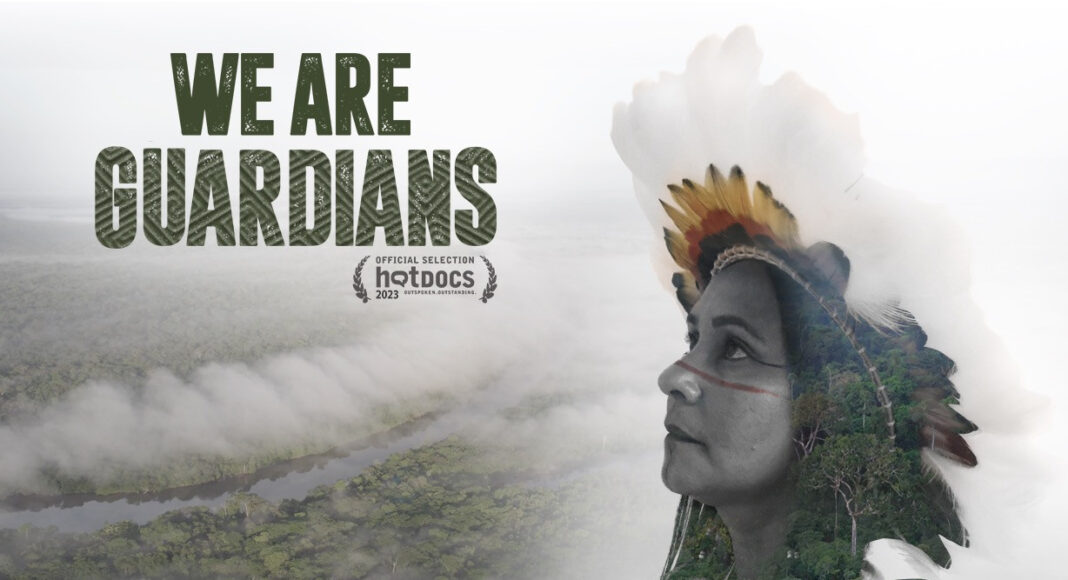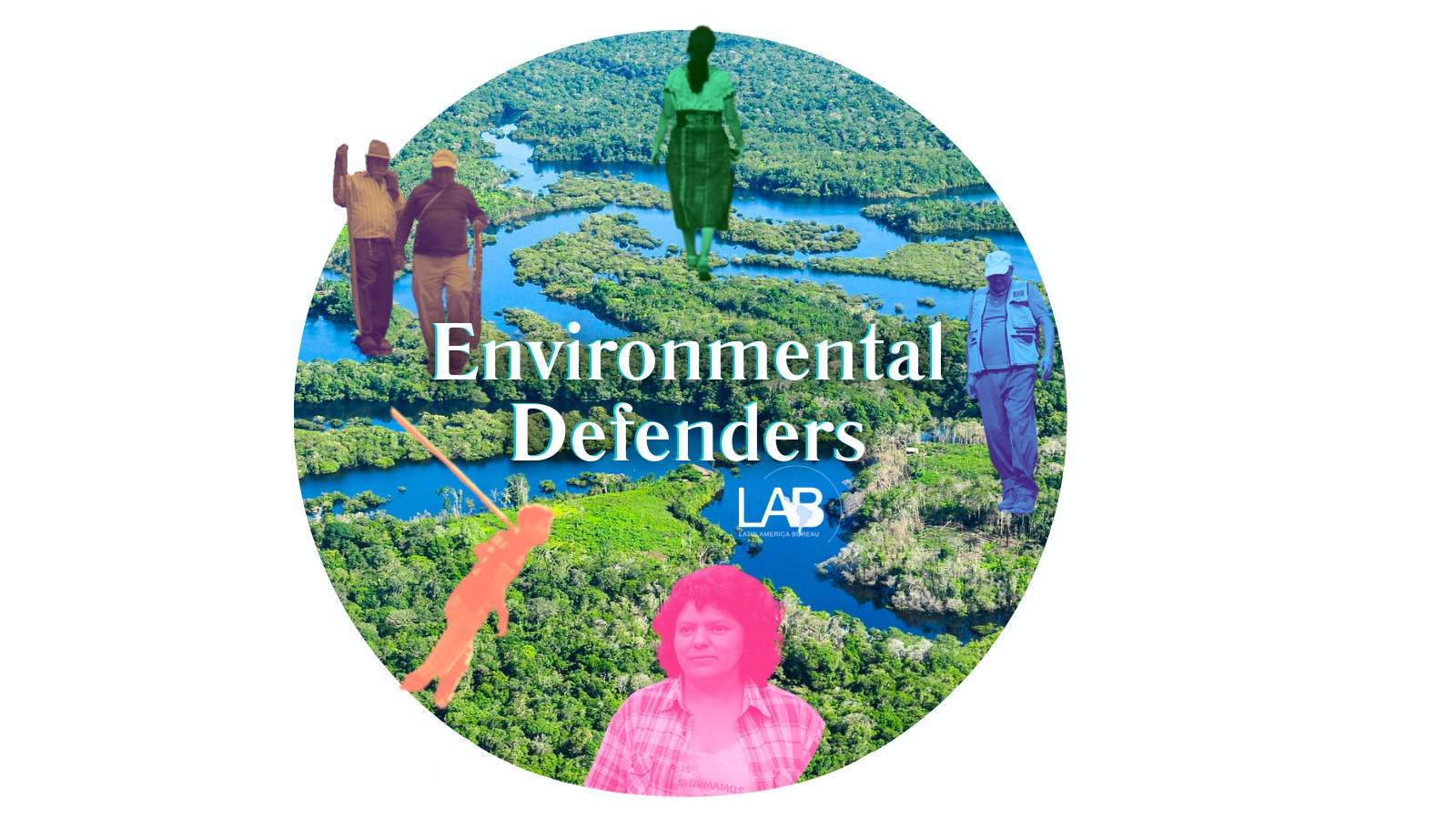Edivan Guajajara is a filmmaker and activist from the Arariboia Indigenous Land whose work centres on the natural world and Indigenous struggle. He has come together with Chelsea Greene and Rob Grobman from One Forest in the documentary We Are Guardians, released this year, to tell the story of Indigenous struggle against illegal encroachments in the Amazon. Catch the film’s UK premiere during Raindance Festival at Genesis Cinema, London, on October 28.
The Amazon rainforest. A vast territory measuring 7,000,000 km² and spread across Venezuela, Guyana, French Guiana, Ecuador, Bolivia, Colombia, Peru, and – most recognisably – Brazil. It is home to more than 30 million people from 350 different ethnic backgrounds divided along national borders and 3,344 formally acknowledged indigenous territories. The canopy of its near 400 billion trees supports the most biodiverse ecosystem in the world, with millions of species of plant and animal life depending upon it.
The last few years have seen a renewed focus on the rainforest. In large part, this is due to Jair Bolsonaro’s authoritarian presidency which rolled back environmental protections over land use whilst pouring racist rhetoric into narratives about Brazil’s Indigenous peoples. There was also the 26th COP, held in Glasgow in 2021 against the tumultuous backdrop of the Covid-19 pandemic and extreme weather events observed with more frequency. In the context of Latin America, this has returned the Amazon to the spotlight as a site of contest for social and environmental justice, led by those who live there. For those that don’t, we’ve been asked to value this natural resource as vital in the global fight against the climate crisis and its key drivers: capitalism and extractive industries.
Edivan Guajajara is a filmmaker and activist from the Arariboia Indigenous Land whose work centres on the natural world and Indigenous struggle. He has come together with Chelsea Greene and Rob Grobman from One Forest in the documentary We Are Guardians, released this year, to tell the story of Indigenous struggle against illegal encroachments in the Amazon.
Their narrative runs deep into the rainforest and its history and back out again into the 21st-century reality of our globalised world. It is a nature documentary about people who are bound up in the life of the rainforest for good and bad.
Along one narrative thread is Marçal Guajajara. He is Regional Coordinator of the Forest Guardians, a coalition of Indigenous people who conduct routine surveillance missions to protect their territories from illegal logging, mining, and land grabbing. Stitched into the piece as something of an antagonist is Valdir Duarte, an informal labourer in his 50s who works illegally logging the trees that Marçal and his community are set on defending. Their opposing positions make clear the tensions and socio-economic drivers at the heart of the issue.
Marçal embodies a historic Indigenous protectorate in the Amazon rainforest. A contemporary reminder too of the brutal history of colonial conquest and its ecologically disastrous drive to extract wealth and resources from the Amazon at the ultimate expense of everyone. He, and others like him, have long understood how to live in harmony with their natural environment. In Valdir are made manifest the harsh realities of poverty, lack of opportunity, and inequality that blight millions of lives in Brazil. It is an uncomfortable truth that the film highlights well. Without logging, Valdir would have no income to support his family. It’s either break the law and destroy the Amazon or go hungry. A condemnation that wins no allies in the fight to halt the damage.
Through Marçal and Valdir, the film looks upwards, at those who wield the economic and political power to change things. It makes for a bleak picture. Names known the world over are invested in the destruction of the rainforest and their willingness to make meaningful change is left heavily in doubt. HSBC, Tesco, J.P. Morgan Chase, BlackRock; the commodities conglomerates Cargill, Louis Dreyfus and Brazil’s own JBS and Bunge: these are just some of the multinational corporations that the film flashes up at points to demonstrate where the power and accountability lies. Though as well, one scene points out the farm of a former environment official who settled it by illegal invasion. It is a stark example of the corruption that undermines the legal and political frameworks meant to protect the region from such events, and the double standards of those in power.
Through Puyr Tembé, Indigenous leader and activist, we get a view directly into the organised political resistance Indigenous peoples have been practicing in Brazil for centuries. Now Secretary of Indigenous Peoples in Pará under Lula, she gives a glimpse into a more hopeful future. It has been hard fought, as we see following her to COP and awaiting Western press, back to Fora Bozo (‘Bolsonaro out’) protests on the streets of Brasília before the emotion of election night in October 2022 announcing the right-wing leader’s defeat and the return to power of Brazil’s left-wing stalwart, Luiz Inácio Lula da Silva.
The film’s triumph is taking the daunting story of environmental destruction in Brazil’s Amazon rainforest and contextualising it within our present moment globally. This is a film with enough light to counterbalance the darkness. The honesty and courage of its protagonists brings it back from the edge of an abject environmental horror story, whilst Valdir’s tar-like nihilism bites down just enough to complicate the picture of what to do. ‘Human’ is often deployed as a cheap shorthand for feeling things in art. We Are Guardians is human by design. Those it follows are our guides and if we are to have hope for our collective future, Puyr, Marçal and their communities must also be our guardians.
WE ARE GUARDIANS (dir: Chelsea Green, Rob Grobman, Edivan Guajajara, Brazil/USA, produced by Leonardo DiCaprio’s Appian Way Productions) will premiere in the UK at Raindance Festival on October 28 at Genesis Cinema. Tickets £9-10 here.


